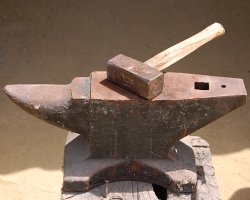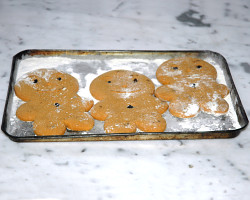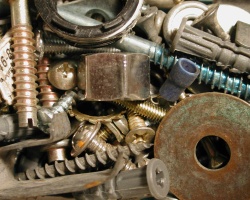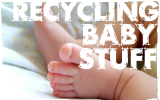How can I reuse or recycle rusty tools?
 We’ve had an email from Janet:
We’ve had an email from Janet:
I’ve been clearing out my dad’s old shed and it is FULL of rusty old tools. Help! What should I do with them!
I guess it depends how “rusty” you mean by “rusty” – if it’s not very, a local community group (say an allotment group if they’re gardening tools) might be willing to refurbish them and put them back into use but if you mean utterly seized and beyond redemption, they might not be so keen.
It also depends on how “old” you mean by “old” – some people collect antique/old tools and equipment, particularly if it is for a specialist purpose so it might be worth investigating that option.
Any other ideas?
(Photo by anbra33)
























If they are completely rusted out, turn them into industrial art. Otherwise, send them to me!
That’s easy. Just dust them off and start using them. I could use the anvil and the mallet easily, every homeowner should have both.
(Just to clarify – that’s a stock photo of some not very rusty tools – but the rustiest picture I could find.
I’m suspect Janet’s tools are slightly more rusted than that.
-louisa)
They could be sold to the scrap yard
makes great garden art
Janet, use a wire brush and get as much rust as you can off of the tools. Then spray them with something like WD-40 and they are ready to use. Old tools are so much better than the new ones today. Hubby and I buy older tools at yard sales or estate sales because they last longer than those you buy nowadays. If the handle is broken, buy an oak handle from a hardware store and replace it. Much better than plastic and lasts longer. Hope this helps.
For tools that are not TOO rusty, Work aid are a charity that refurbishes old tools and equipment for vocational training projects in the third world. Other examples of things they re-use are manual typewriters and sewing machines.
http://www.workaid.org/
If they’re rusty but repairable, wire brushes and some penetrating oil will work wonders; my favorite product for loosening up rusty tools is PB Blaster (the can looks ridiculous, but it really does work). There are number of rust removal products on the market, often used for woodworking tools to remove surface rust (e.g., http://www.rockler.com/product.cfm?page=11500&filter=rust).
If the tools are broken or pitted/rotted beyond repair, most areas with any manufacturing industry will have some scrap metal recycling facilities. Though some may not take small lots, they may be able to refer you to an individual in your area that collects scrap. Keep in mind that your scrap metal is worth cash, so if you’re depositing significant mass, find out what the market price is before giving it up; searching google for “scrap metal prices” should provide decent information.
I was going to suggest workaid.org but hazel_tree beat me to it.
freecycle.com is a nice concept for recyling any stuff you don’t need anymore.
Regarding rust, don’t worry old tools are usually made of terrific steels and the rust is just on the surface. They clean up a treat.
Sounds like no tool is too rusty except maybe a pair of cheap scissors.
You can use them for all sorts of crafty things:
Candle Holders & Racks:
http://www.hgtv.com/hgtv/dc_refurbish_reuse_recycle/article/0,,HGTV_3490_2349009,00.html
Wind Chimes & Lamps:
http://www.hgtv.com/hgtv/dc_refurbish_other/article/0,,HGTV_3488_2990168,00.html
Organizers & Holders:
http://www.hgtv.com/hgtv/dc_refurbish_accessories/article/0,,HGTV_3484_1394363,00.html
Other Household items & accessories:
http://www.hgtv.com/hgtv/dc_refurbish_other/article/0,,HGTV_3488_1374337,00.html
HTH – I hope these ideas helps!
Excellant! Thanks.
I would say use WD-40 and lots of it
contact your local Tools for Self-Reliance group. They have local groups all over the UK, they take old tools, refurbish them and send them in packs to artisans (carpenters, blacksmiths, tailors) in Africa. – so promoting re-use and sustainable livelihoods
link is:
http://www.tfsr.org/
remove the rust by soaking in Coke then you can reuse it for the same purpose or perhaps make them paperweights.
Onions!
Randomly they seem to clean rusty scissors and blades surprisingly well, just plunge said rusty object repeatedly into onion until nice and clean
I usually Can reuse rusty bolts because if you have a thumbtack and you bend it at the tip and pick at the grooves in the bolt till its sharp.
How about re-tapping them?
I work around old tools for a living. The best, cheapest and least toxic method of removing rust is molasses dissolved in warm water.
Yes… you read it right… molasses!
Remove any grease and oil with hot soapy water beforehand, to allow the mix to penetrate the steel. Half a Coke can of molasses to a bucket of water should do it. It is slower than the other methods (allow about two weeks depending on ambient temperature) BUT it does not harm the surface of the metal in any way, which is important if the tool is a collectors item.
BE WARNED: This method can make the metal look brand new, so if you want to maintain a bit of an aged appearance, it is important to keep an eye on progress and stop it when you are happy.
The liquid can be reused for about six months, but it does tend to smell bad after a while, so you need to set up a place specially for the job.
After treatment, dry it off, a light rub with fine steal wool should remove the stubborn bits. Then coat it with a mix of linseed oil and turps.
I’ve seen this method used to clean engine blocks! Also works on non-ferris metals.
I have been informed to soak them in cola, and then brush them up and they apparantly look good as new…
If you live inthe Northampton UK area you can donate them to Hope Tools, who will rrecyckle and refurbish them and sell them to raise money for our work with homeless people. We even employ homless people to do the repairs so people get a foot out of homlessness through the work. Keep up to date with our Hope Enterprises twittter page and Hope Centre face book page
Tools for Self Reliance Cymru is a small Charity based in Wales. We send refurbished hand tools to rural artisans in Tanzania to help them improve their livelihoods. We also recycle gardening tools (which are not required in Tanzania) to sell in the UK in our shop and at fairs and festivals to help raise funds to cover the cost of sending the tools to Africa. If you have suitable tools to donate, email contact@tfsrcymru.org.uk to discuss how you can help. Not all tools are required as we have limited storage.
You can also find us on Facebook and Twitter @tfsrcymru or Instagram Tools2Africa
Thanks/Diolch/Asante